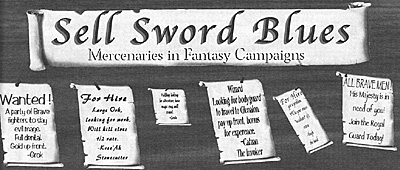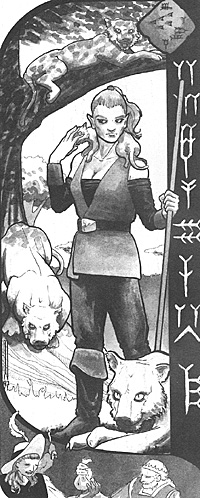 Soldiers for hire are the unsung heroes of warfare;
appreciated by few, needed by many, they bolster armies, train
generals, and topple kingdoms. All the glory and rewards go
to others while they forever hug the shadows of history,
fighting battles for a few coins and a bunk of dry hay, but
there is much more to the profession than just taking cash and
swinging a sword. This article is meant to help GMs and
players introduce compelling mercenaries - singly or in
companies - for their fantasy campaigns.
Soldiers for hire are the unsung heroes of warfare;
appreciated by few, needed by many, they bolster armies, train
generals, and topple kingdoms. All the glory and rewards go
to others while they forever hug the shadows of history,
fighting battles for a few coins and a bunk of dry hay, but
there is much more to the profession than just taking cash and
swinging a sword. This article is meant to help GMs and
players introduce compelling mercenaries - singly or in
companies - for their fantasy campaigns.
Mercenaries
A mercenary (or "merc") is basically anyone who offers his services as a fighting man purely for money. Though national soldiers often receive monetary compensation, their primary motivations are duty and honor or, in the case of conscripts, desperation and necessity. To a merc, fighting battles is a matter of fulfilling a contract. Nothing more, nothing less.
Lone mercs are very common, most often former soldiers cut loose by their army of origin after a conflict. They pursue a career as a sell-sword because they may know of no other life, or they are trying to escape the eternal drudgery of the peasant farms where they were raised. Some may be deserters, some may be lone survivors of doomed causes. Others may be driven by religious conviction or dreams of personal glory to seek combat whenever possible. A bully or a psychotic may revel in hurting others, and thus be delighted to discover that they can be both officially sanctioned and regularly paid for it. Impoverished families or villages may send their best fighters into the world as mercenaries to aid them financially.
 Mercenary companies, where a number of sell swords
band together and share the profits, are often composed of
such people, but as a group-entity they exist for very different
reasons. A company is primarily a business venture, and is
run like any other profitable organization. Sometimes, a merc
company may have an ulterior motive, such as fulfilling their
killing quota for the local death-goddess or winning glory for
their home city-state, but even then monetary compensation is
a major factor in any contract they take. Mercenary companies
may be as small as three or may have hundreds.
Mercenary companies, where a number of sell swords
band together and share the profits, are often composed of
such people, but as a group-entity they exist for very different
reasons. A company is primarily a business venture, and is
run like any other profitable organization. Sometimes, a merc
company may have an ulterior motive, such as fulfilling their
killing quota for the local death-goddess or winning glory for
their home city-state, but even then monetary compensation is
a major factor in any contract they take. Mercenary companies
may be as small as three or may have hundreds.
A mercenary's main function is to supplement a national or regional fighting force. Any ruler who depends purely on mercenaries for the defense of his kingdom has a hold on his throne only as strong as his treasury is rich. In times of war, mercenaries will comprise perhaps 30% of a total available fighting force. In peace time, this number will likely be considerably less.
Mercs are also hired in much smaller numbers by private interests, usually as bodyguards or escorts. However, such jobs are few and hotly contested, and most mercs never see such duty. The majority of an average sell-sword's life revolves around the battlefield and military service.
Sometimes mercenaries will be hired on a one-time basis for specialty jobs, such as castle sieges or intelligence gathering. Other times, their contracts may span months, years, the entirety of a war, or even their lifetimes, depending on the nature of the conflict they sign on for.
foot soldier
The job that requires the least skills and the most work. Many of the younger, poorer, and least experienced are also the most desperate mercs, and are forced into foot-soldier roles. Lone sell-swords hired as foot soldiers will often be assigned to a regular army company and treated just like any other conscript. They will receive the same amount of pay as regular soldiers and will be equipped by the army if they cannot provide their own weapons. [Rarely] If enough mercs are hired, they will be formed into a separate squad or company run by army officers. Mercenary bands hired as foot soldiers will often be at the poorer end of the spectrum, and are almost always expected to provide their own equipment.
archers
Lone mercs who specialize as bowmen will often find their lot slightly better than spear-carrying grunts. Skilled archers are always sought after by military commanders.
squad leaders and command officers
Lone mercs who are known as experienced soldiers or who have good reputations as tacticians may be hired to command army regulars. These soldiers will usually become sergeants or tow-ranking officers. A mercenary will never be given higherlevel commissions than captain, unless the employer's army is extremely depleted and desperate.
A mercenary officer is considered the equal of a regular army officer to subordinates; disobeying the orders of a lieutenant simply because he is a mercenary will carry the same penalty as disobeying a regular army lieutenant. Peers and superiors, however, will often treat the mercenary officer like a mistrusted outsider, all of their interactions with him will be laced with a great deal of derision and condescension. Conan the Cimmerian, in many of his original stories, often hired himself out as this kind of mercenary.
trainers and drill instructors
In the real world, this is the most common occupation for mercenaries. Mercs are often far more experienced than common foot soldiers, many of whom were drafted directly from the turnip fields. Having one merc effectively train dozens of soldiers is seen by an employer as maximizing his investment with the sell-sword. A small merc company composed of a number of specialized trainers (one maybe an expert in archery, another in swordmanship, a third in polearms, and so on) will do well for itself in both peace and war.
scouts
Recon and intelligence are the second most common tasks given to mercenaries. Scouts clandestinely maneuver close to or behind enemy lines to ascertain troop positions, numbers, artillery, and so on, then report back; this requires a sell-sword with very specialized skills, including stealth, concealment, and possibly disguise. They must able to swim climb, crawl, and ride with the best of them.
Small mercenary bands will often specialize in scouting, and these companies will sometimes own and maintain their own personalized animals and/or equipment (spy glasses, disguise kits, horses specially trained for stealth riding, and so on).
cavalry
In medieval times, these were the most common field combat mercenaries. They are almost always found formed into companies. They always own and maintain their own horses, and upkeep for the animals and related equipment is always a provision in their contracts. In such groups, the bond between rider and horse is very strong; many will treat their mounts better than their mistresses.
 animal handlers
animal handlers
These mercs are uncommon, but are useful when an army can find one. They are free-lance soldiers who specialize in working with one particular type of animal. Homing pigeon specialists, for example, may handle communications for a company or a battalion, while a dog handler will be called upon to use his charges for tracking and guarding missions.
artillery specialists
In most armies, these specialists are highly-sought after and are highly paid. Artillery crews have high casualty rates (both from frequent mishaps and drawing the heaviest amount of enemy fire), so any real skill in handling and keeping up devices such as catapults, ballistae, and siege towers is fairly rare.
A merc in this field of expertise is expected to know his weapon inside and out, and can instruct and lead a team of army regulars in its operation. Often, a small company will hire itself out as a complete artillery team, being able to operate one siege engine entirely on its own. A large, well seasoned group of artillery specialists with their own quality equipment would also be highly prized in decisive sieges.
engineers and siege experts
In medieval times, engineers were the single-most valuable mercenary a ruler could hire. They are the most highly paid, and unlike others of their profession, are always treated with respect and courtesy.
An engineer, in the medieval sense, is someone who is expert at building and penetrating castles. They also have knowledge of building defensive earthworks, tunnels, and other fortifications. This expertise does not come easily or cheaply, as it is the result of decades of apprenticeship and/or practical experience.
Since castle sieges were such an integral part of medieval warfare, engineers were indispensable to both sides. Free-lance engineers were so prized that they were rarely harmed; even if their army was overrun, the engineer would be spared so that the victorious army could hire them.
Rare soldiers who live through enough sieges can hire themselves out as siege experts. They don't carry quite the same prestige as an engineer, but can be hired if a properly-trained engineer proves to be unavailable. Free-lance engineers and siege experts usually work with a small retinue of assistants, commonly family, or apprentices. Provisions for the assistants would be included in their contracts.
assassins
An assassin's primary purpose is to sneak into enemy strongholds and eliminate vital personnel. They are rarely used and greatly mistrusted by regular army officers. However, in campaign settings where honor is highly prized by military officers, a different and better-trusted type of assassin can be included -- the "duelling assassin".
Basically, the duelling assassin would approach an enemy camp and challenge his target to a duel of honor, based on real or imagined wrongs. After the target had prepared himself, the assassin would meet and battle him in an honorable fight to the death.
guards and escorts
These specialists are rarely hired by armies. Rather, they are employed by private interests such as mercantile houses, caravans, temples, nobles, and rulers. They have proficiency in security tactics related to a specific person, structure, or mobile column. When no wars are afoot, many lone sell-swords and small merc bands make ends meet as guards and escorts for anyone with coin.
A few small bands who specialize in security secure a profitable career for themselves in this manner. GMs should be aware of the level of competition that is created when there are more guards than there are jobs - this is how banditry starts in the first place.
support personnel
Interestingly enough, one of the most sought-after types of mercenaries is the military cook. This person must not only be skilled in preparing meals for large groups, he must also be knowledgeable in foraging techniques, recognizing poisonous flora, rationing, and so on. Though most squads in a medieval army foraged for their own food, the cook would tend to the officers' needs and warn the enlisted men about what not to eat in a particular area.
Also in demand were non-magical healers, ones with real knowledge of treating wounds and diseases. A doctor's main purpose in an army is not to so much heal wounds, but to prevent and control the spread of disease. Throughout history, twenty times as many soldiers died from disease and infection as from injuries directly related to combat.
Other valued types of non-combatant mercs include armoires, blacksmiths, bowyers, fletchers, tanners, stable hands, valets (for pampered officers) and wagoners.
 magic wielders
magic wielders
In a world where magic is an everyday occurrence, wizards are an indispensable part of warfare. In most fantasy campaign settings, low level sorcerers (sometimes referred to as "hedge wizards") are fairly common. They will often he used at squad level to supplement regular troops, acting like the tactical equivalent of modern day heavy gunners. Mercenary hedge wizards, especially those that specialize in combat, communication, or divination spells, will always be able to find employment with a military organization, either as troops or consultants. They will generally be treated and paid better than foot soldiers, but not as well as officers. Wizards are rarely, if ever, given command of actual troops.
More powerful sorcerers, the kind that can toss around multiple firebolts and summon other-dimensional monsters, are often an army's single most valuable asset, and will be treated as such. They are the fantasy equivalent of modern day heavy artillery. In fact, the presence of several powerful wizards can often shift the balance of power between two forces. Such mages for hire will always command top wages (even more than engineers in some cases). However, as a rule, soldiers distrust powerful wizards, and military commanders usually see them as distasteful necessities.
Merc companies formed entirely of wizards are rare but not unheard of; even the Black Company only had three wizards, and they were rarely found unaccompanied.
Priests and clerics are another matter entirely. Throughout history most armies had spiritual advisors of one sort or another, a practice that continues today in the form of military chaplains. In most fantasy campaigns, priests wield healing spells, an any cleric who is willing to hire out his magical abilities will be worth his weight in gold. A priest's connection with the gods may also give him divination powers that can prove useful in military campaigns.
Holy mercenaries directly sponsored by a particular religious sect are rare, but may sometimes be found if their temple is in dire need of funds or if the sect has a personal interest in the patron army's goals. Merc priests typically either work as loners or in groups of their own faith.
mercenary companies
Most mercs are loners, and handle their profession like any independent contractor - they go in, do the job, get paid, and move on to the next war. However, some mercenaries band together to form companies.
Companies can form for any number of reasons. The principles may be old army buddies who want to go into business for themselves, or the company may be an experimental venture sponsored by a mercantile guild. A religious sect devoted to the local god of war may want to spread their message while earning a number of generous "donations" from friendly generals. A band of successful adventurers may incorporate into a company for the sake of greed and ego.
small companies
Smaller bands, numbering from three to a dozen individuals are fairly common, and are usually specialized in some way: training, scouting, and cavalry bands are the most common. Small companies such as these are very informal. There will generally be one designated spokesman or leader, but otherwise rank is rarely an issue. Pay is usually shared equally, and resources pertaining to the group's success are often made available to all.
Because of this friendly intimacy, most small bands are suspicious or even hostile to outsiders. Rarely will new members be accepted, and only if a vacancy is available. In addition, the candidate will have to prove himself before they are accepted as a real member of their fighting force; this is a great way to create a revolving campaign when players cannot stay for long, or on a regular basis. The initiation of a new member could include a variety of rituals and pledges, in addition to sticking it out for a few sessions. Less treasure and experience points could be part of this growth too.
Positions in small bands are sometimes inherited, and may run across generations. Most small companies, however, have a short life span, resulting from financial difficulties, a severe depletion of numbers, or an intense conflict of personalities.
large companies
Those composed of several dozen to several hundred men, are rare, and one will usually not find more than one or two in any particular region. More often then not, they originate as companies that have gone rogue and deserted their home army. As traitors, they are forced to make their way in foreign lands acting as sell swords.
Sometimes they are started up by rich houses who have the capital to invest in the enormous expenditure of getting such a company off the ground. Once in a while, a small band may become successful enough to expand slowly over the years, blossoming into a much larger unit.
Large companies rarely specialize. They sell themselves as complete fighting forces, providing their own foot soldiers, officers, cavalry, and specialists. A large company's main selling point is their status as an elite unit, composed mostly of veterans and hand picked specialists, as opposed to national armies (see below) composed mainly of conscript peasants. To a ruler, hiring a large merc company is a tactical investment, used to shore up weak points in his military machine.
national mercenaries
This is a practice that has been popular since ancient times, and is still in limited use today. In times of peace, a ruler will lend out small portions of his army to an allied nation for a price. In this way, the battalion or company lent can earn extra gold for the crown while also accumulating valuable combat experience for future conflicts.
National mercenaries are by far the largest type of mercenary company, ranging from sever hundred to several thousand men - most independent companies can't afford the overhead of so many personnel. As they are the origin nation's regular army, they will usually be given top of the line equipment. Sometimes more so, if the sponsoring king wants to make an impression on his peer.
Back to Shadis #50 Table of Contents
Back to Shadis List of Issues
Back to MagWeb Master List of Magazines
© Copyright 1998 by Alderac Entertainment Group
This article appears in MagWeb.com (Magazine Web) on the Internet World Wide Web.
Other military history articles and gaming articles are available at http://www.magweb.com